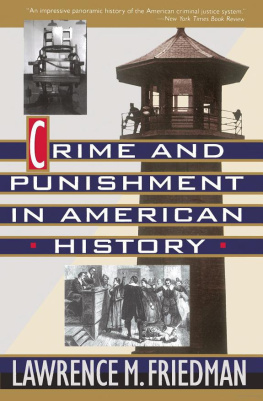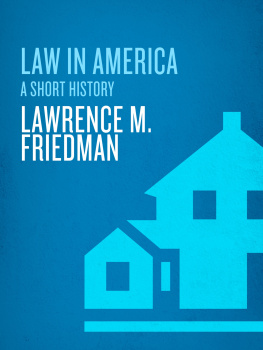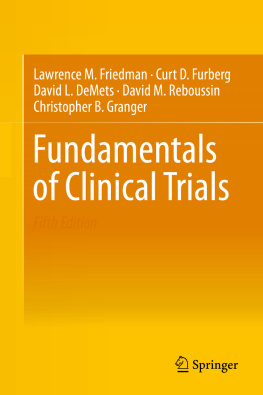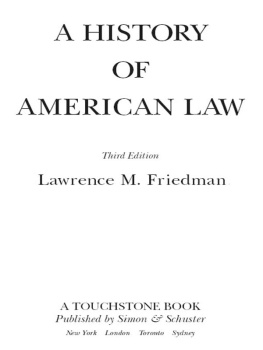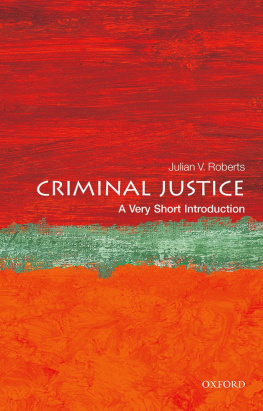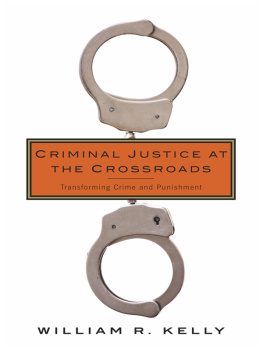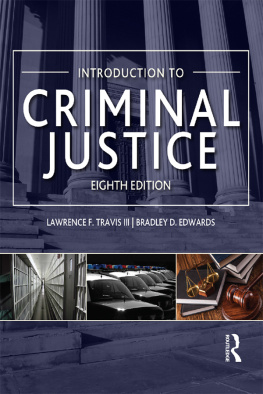First published 1997 by Westview Press
Published 2019 by Routledge
52 Vanderbilt Avenue, New York, NY 10017
2 Park Square, Milton Park, Abingdon, Oxon OX14 4RN
Routledge is an imprint of the Taylor & Francis Group, an informa business
Copyright 1997 Taylor & Francis
All rights reserved. No part of this book may be reprinted or reproduced or utilised in any form or by any electronic, mechanical, or other means, now known or hereafter invented, including photocopying and recording, or in any information storage or retrieval system, without permission in writing from the publishers.
Notice:
Product or corporate names may be trademarks or registered trademarks, and are used only for identification and explanation without intent to infringe.
Library of Congress Cataloging-in-Publication Data
Friedman, Lawrence Meir, 1930
The crime conundrum: essays on criminal justice / by Lawrence M.
Friedman and George Fisher.
p. cm.
ISBN 0-8133-9021-4.
1. Criminal justice, Administration ofUnited States.
I. Fisher, George, 1959 . II. Title.
HV9950.F75 1997
364.973dc21 97-13001
CIP
ISBN 13: 978-0-367-29108-2 (hbk)
Jonathan D. Casper is Professor and Chair of the Political Science Department at Northwestern University and a Senior Research Fellow at the American Bar Foundation. His research interests have included the role of attorneys in civil liberties and civil rights cases before the Supreme Court; defendant attitudes towards their experiences in criminal courts; pleabargaining and sentencing reform; and in recent years the role of information processing and cognitive biases in jury decisionmaking. His current project focuses on hate speech on college campuses.
Elliott Currie is the author of Confronting Crime: An American Challenge; Reckoning: Drugs, the Cities, and the American Future; Dope and Trouble: Portraits of Delinquent Youth; and, with Jerome H. Skolnick, Crisis in American Institutions and America's Problems: Social Issues and Public Policy, He received his doctorate in sociology from the University of California at Berkeley, where he teaches in the Legal Studies Program and is affiliated with the Center for the Study of Law and Society. He is Vice-Chair of the Milton Eisenhower Foundation in Washington, D.C., which supports innovative crime and delinquency prevention programs in the inner cities. He serves on the editorial board of the new international journal, Theoretical Criminology, and is currently completing a book on the state of crime and punishment in the United States.
John J. Donohue , Professor of Law and John A. Wilson Distinguished Faculty Scholar at Stanford Law School, has a Ph.D. in economics from Yale University and a law degree from Harvard Law School. From 1986 to 1995, he taught at Northwestern Law School and was a Research Fellow at the American Bar Foundation. He is currently a member of the Labor Studies section of the National Bureau of Economic Research. His broad focus is on the empirical evaluation of public policy measures, and in recent years he has written about the macro-policy choices involved in the criminal justice system.
George Fisher is Associate Professor of Law at Stanford Law School and a former Massachusetts prosecutor. He has written on the history of criminal punishment and procedure.
Lawrence M. Friedman is the Marion Rice Kirkwood Professor of Law at Stanford Law School. He is the author of A History of American Law (2d ed., 1985), The Republic of Choice: Law, Authority, and Culture (1990), Crime and Punishment in American History (1993), and many other books and articles on legal history and the relationship of law and society. He is a past President of the Law and Society Association and the American Society for Legal History, and a member of the American Academy of Arts and Sciences.
Rosemary Gartner is Professor of Sociology at the University of Toronto, where she is also affiliated with the Centre of Criminology and the Faculty of Law. Her current research includes a study of homicide in two Canadian cities and two U.S. cities over the twentieth century and a study of women's experiences in two prisons in California.
John Hagan is Professor of Sociology and Law at the University of Toronto. His most recent books are Crime and Inequality (with Ruth Peterson, Stanford University Press), Gender in Practice: A Study of Lawyers' Lives (with Fiona Kay, Oxford University Press) and Mean Streets: Youth Crime and Homelessness (with Bill McCarthy, Cambridge University Press). Professor Hagan is currently a German Marshall Fund Fellow.
Valerie P. Hans is Professor of Criminal Justice and Psychology at the University of Delaware. Her research and writing center on the relationship between the public and courts, and reflect her background in psychology as well as her preference for interdisciplinary approaches to the study of law. She has lectured and written widely about the institution of the jury, and is coauthor (with Neil Vidmar) of fudging the Jury. In other research and writing, she has explored public opinion about law and the courts, and the impact of the media on people's views of the legal system. Currently, she is working on two projects, one that examines how juries decide cases with businesses and corporations, and another (with the National Center for State Courts) that evaluates an Arizona jury reform that allows civil jurors to discuss the evidence with one another during the course of the trial. Her writing for the essay in this volume was facilitated by the Center for Advanced Study fellowship from the University of Delaware.
Daniel Krislov , J.D. Stanford, 1994, is a Ph.D. candidate in Jurisprudence and Social Policy at the University of California at Berkeley. He is currently working on his dissertation on the politics of federal criminal justice policy.
Richard A. Leo is Assistant Professor of Criminology, Law and Society at the University of California, Irvine. He is currently completing a book on police interrogation practices in America that will be published by New York University Press.
Marc Miller is Associate Professor of Law at Emory University School of Law in Atlanta, Georgia, where he has taught since 1988. Between 1987 and 1996 he was a Founding Editor of the Federal Sentencing Reporter (University of California Press), which he now serves as Advisor. Before coming to Emory Professor Miller served as Special Counsel at the Vera Institute of Justice (New York City), Attorney-Advisor in the Office of Legal Counsel, U.S. Department of Justice, and clerk to Chief Judge John C. Godbold on the U.S. Court of Appeals for the Eleventh Circuit. Professor Miller is co-editor of the full-spectrum criminal procedure casebook Criminal Procedures: Judicial, Legislative and Executive Materials (Little Brown/ Aspen Law & Business, 1998).


